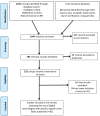Precision Global Health - The case of Ebola: a scoping review
- PMID: 30701068
- PMCID: PMC6344070
- DOI: 10.7189/jogh.09.010404
Precision Global Health - The case of Ebola: a scoping review
Abstract
Background: The 2014-2016 Ebola outbreak across West Africa was devastating, acting not only as a wake-up call for the global health community, but also as a catalyst for innovative change and global action. Improved infectious disease monitoring is the stepping-stone toward better disease prevention and control efforts, and recent research has revealed the potential of digital technologies to transform the field of global health. This scoping review aimed to identify which digital technologies may improve disease prevention and control, with regard to the 2014-2016 Ebola outbreak in West Africa.
Methods: A search was conducted on PubMed, EBSCOhost and Web of Science, with search dates ranging from 2013 (01/01/2013) - 2017 (13/06/2017). Data was extracted into a summative table and data synthesized through grouping digital technology domains, using narrative and graphical methods.
Findings: The scoping review identified 82 full-text articles, and revealed big data (48%, n = 39) and modeling (26%, n = 21) technologies to be the most utilized within the Ebola outbreak. Digital technologies were mainly used for surveillance purposes (90%, n = 74), and key challenges were related to scalability and misinformation from social media platforms.
Interpretation: Digital technologies demonstrated their potential during the Ebola outbreak through: more rapid diagnostics, more precise predictions and estimations, increased knowledge transfer, and raising situational awareness through mHealth and social media platforms such as Twitter and Weibo. However, better integration into both citizen and health professionals' communities is necessary to maximise the potential of digital technologies.
Conflict of interest statement
Competing interests: The authors has completed the Unified Competing Interest form at www.icmje.org/coi_disclosure.pdf (available on request from the corresponding author) and declare no competing interests.
Figures
References
-
- World Health Organisation. Ebola situation report(s). 2016. Available: http://apps.who.int/ebola/ebola-situation-reports. Accessed: 12/04/2017.
-
- Centre of Disease, Control and Prevention. Estimating the Future Number of Cases in the Ebola Epidemic – Liberia and Sierra Leone, 2014-2015. 2014. Available: https://www.cdc.gov/mmwr/preview/mmwrhtml/su6303a1.htm. Accessed: 18 April 2018.
Publication types
MeSH terms
LinkOut - more resources
Full Text Sources
Medical
Miscellaneous


